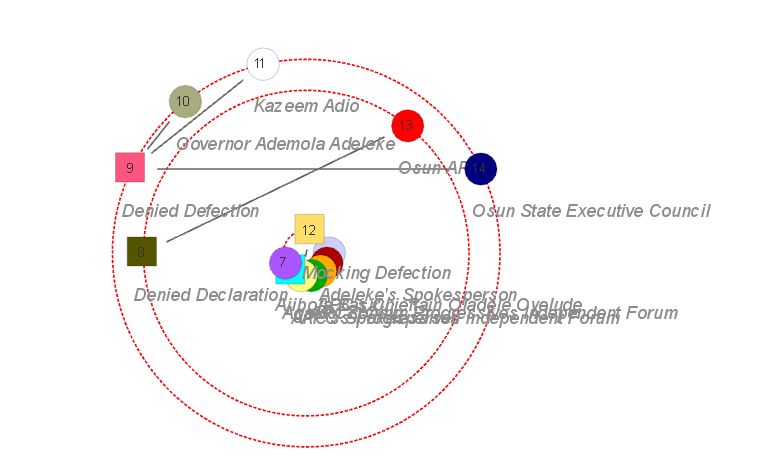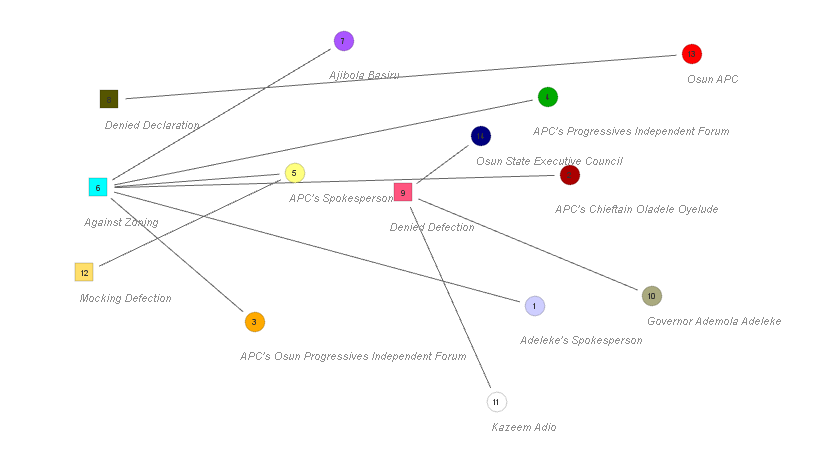
The road to the 2026 election in Osun State is already being paved, not just through rallies or declarations, but through the way issues are discussed and framed in public. Long before official campaigns begin, conversations about zoning and party defections are shaping the political environment and revealing who really holds sway over the minds of voters.
Recent insights, from our analysis of conflict network as reported by national dailies, into public discourse around these topics show that influence is no longer limited to those in office or those with party titles. Instead, the real power lies with those who are shaping the narratives and responding swiftly to developments. For party executives and political leaders in Osun, understanding how these dynamics work is essential if victory is to be secured.
Who is Shaping the Political Climate?
Register for Tekedia Mini-MBA edition 19 (Feb 9 – May 2, 2026).
Register for Tekedia AI in Business Masterclass.
Join Tekedia Capital Syndicate and co-invest in great global startups.
Register for Tekedia AI Lab.
While elected leaders like Governor Ademola Adeleke remain central to political leadership, they are not necessarily at the heart of the conversations dominating public attention. In fact, figures such as spokespersons, party chieftains, and even coordinated public relations activities are playing larger roles in steering the political climate.
What stands out is that certain themes and activities are driving a significant part of the discussion. For example, phrases like Denied Declaration and Denied Defection are not names of individuals but represent responses to claims in the public space. They often arise when parties try to manage rumors about internal crises or speculation about defections. Surprisingly, these denials are proving to be some of the most powerful forces in shaping the current political atmosphere. The fact that such themes are dominating the conversation tells us that the public is highly reactive to political controversies, especially those that suggest cracks within party structures.
Exhibit 1: Emerging conflict network of Osun 2026 election

Similarly, Mocking Defection, a phrase that refers to ridicule or dismissal of claims about defection, has gained traction. It reflects how satire, spin, or media commentary can sometimes become more influential than official statements. This suggests that the battle for voter perception is being fought not only through press conferences but also through subtle messaging, public sentiment, and online reactions.
Zoning is More Than a Policy Question
One of the most influential issues in the buildup to 2026 is zoning. Discussions around zoning are not new, but in this electoral cycle, they have become a focal point of both unity and division. The theme of Against Zoning is proving to be one of the most dominant elements in the political space today. This shows that there is significant resistance to any predetermined arrangement about where the next governor should come from.
For party executives, this is a clear signal. Zoning is no longer just an internal discussion for stakeholders or party elders. It is a public issue, one that resonates with communities and voters who feel either entitled or excluded. Leaving this debate to chance or ignoring it altogether could allow rival parties or interest groups to define your party’s position for you. Now is the time to craft a clear, consistent message about where your party stands and, more importantly, why.
Why Spokespeople Matter More Than Ever
Another pattern emerging from the analysis is the central role of party spokespeople. In particular, those aligned with the APC are among the most active and influential voices in these ongoing debates. These individuals are not just relaying information. They are defining the tone and pace of political engagement. They can frame issues in ways that rally support, defend the party from criticism, and even destabilize opposition narratives.
Exhibit 2: Who holds the centre of the conflict and information flow

For party executives, the lesson is simple. Spokespeople are frontline defenders and promoters of your party’s vision. They need more than access to microphones. They need guidance, message discipline, and alignment with the party’s long-term goals. A well-prepared spokesperson can steady a party during a crisis. A careless one can trigger unnecessary damage.
Institutions Still Matter
While individual voices and controversial themes are shaping the headlines, party structures like the Osun APC and the Osun State Executive still play a meaningful role. They may not dominate the daily conversation, but their presence carries institutional weight. When these bodies are aligned with strong messaging and active engagement, they lend credibility and order to the party’s public image.
It is important for executives to ensure that these structures are not only functioning internally but also visible externally. A party whose official bodies are silent during heated debates appears disorganized, even if things are well-managed behind closed doors. The public needs to see that these institutions are not just administrative but actively shaping the direction of the party.
What Party Executives Should Do Now
So what does all of this mean for the party leaders and executives guiding their organizations through these uncertain waters?
It is clear that zoning cannot be left to chance or brushed aside as a behind-the-scenes negotiation. Whether a party intends to support zoning or not, silence on the matter only leaves room for others—opponents, disgruntled members, or external commentators—to shape the story. Voters are already paying attention. Community groups are already forming opinions. If the party fails to clearly communicate its stance, it risks being misunderstood or misrepresented. Executives must lead the way in defining where the party stands and, more importantly, why.
The role of spokespeople must be treated with the seriousness it deserves. These individuals are no longer just messengers. They are often the first point of contact between the party and the public. A well-informed and disciplined spokesperson can defuse tension, redirect negative press, and amplify the party’s strengths. On the other hand, vague, inconsistent, or off-the-cuff comments can create confusion and mistrust. It is the responsibility of party leadership to ensure their spokespeople are prepared, supported, and speaking with one voice.
It is time to start listening more closely to the public mood. Certain phrases, such as those tied to denial of defection or declarations, may seem like passing media cycles, but their frequent appearance in political conversations shows they are sticking with people. These themes tell us what the public is watching, what they are skeptical about, and where they may feel misled. Rather than dismissing them as distractions, party leaders should see them as signals, early warnings that the narrative is moving and might need a response.
Party structures themselves, executive councils, state organs, official platforms, must not remain in the shadows. These institutions carry the weight of legitimacy, and when they engage publicly with unity and purpose, they reassure supporters that the party is focused and in control. A silent or fragmented executive body during moments of political tension can signal internal weakness, even if everything is orderly behind the scenes. The public needs to see that these institutions are not only functioning but also visibly guiding the party’s direction.
In this moment, the most successful party leaders will be those who understand that politics is no longer only about winning elections. It is about managing perceptions, responding quickly, and staying ahead of the conversation. The question is not whether your party will be discussed, it already is. The real question is whether you will shape that discussion or let others do it for you.



